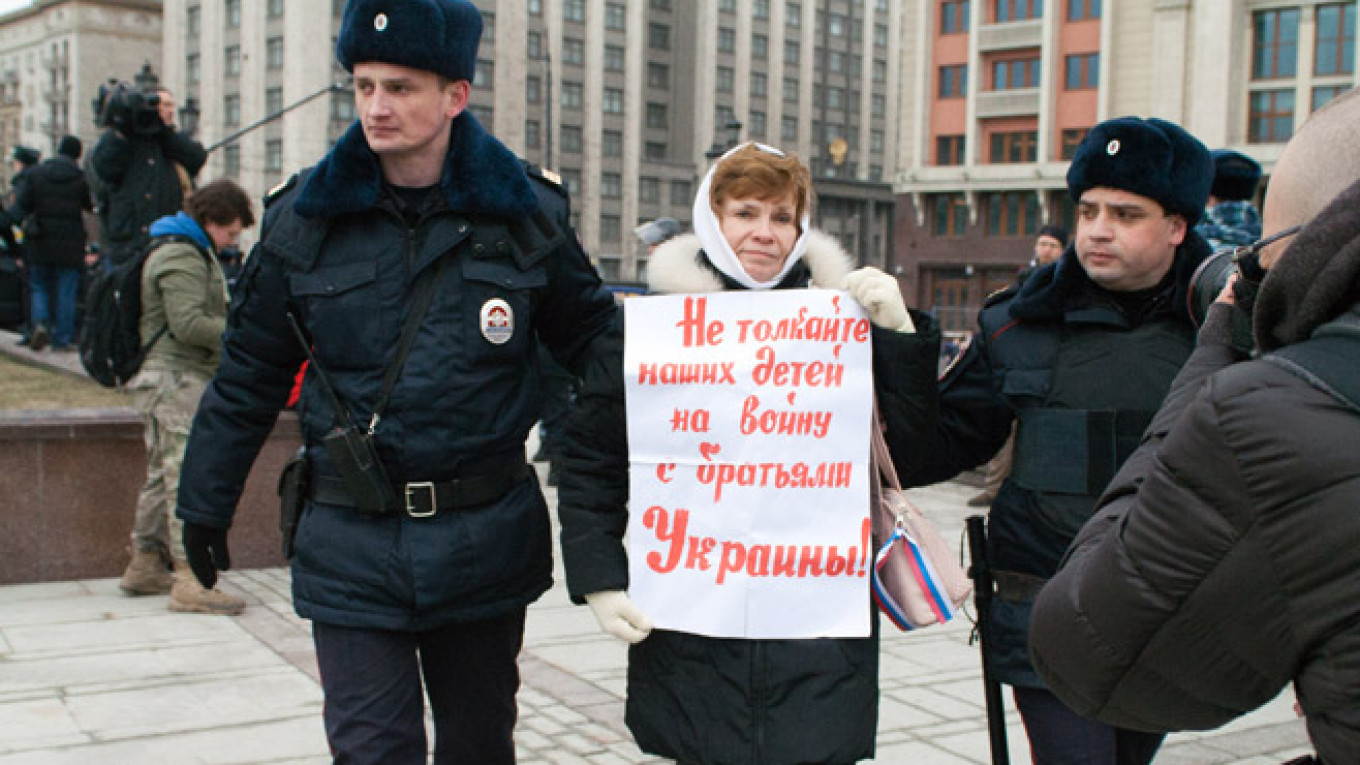In late February when "polite green men" emerged in Crimea, I was at the Human Rights Watch annual staff gathering in New York. In fact, the day before the full-scale invasion, one of our board members asked me, "Tanya, do you think there is any chance Russia will invade?" I shrugged nonchalantly. "There are so many other strings Russia can pull as far as Ukraine is concerned, so why would it go that far?" When I woke up the next morning, the invasion had happened and my much-acclaimed Russia expertise had failed me again.
No matter how many years you have been working on and in a country, certain things are hard to predict. The Kremlin's vicious crackdown on civil society was unleashed with Vladimir Putin's return to the presidency a little more than two years ago. All the fragile accomplishments of Dmitry Medvedev's interregnum, with its quasi-liberal rhetoric, were wiped away in mere months. A series of repressive and discriminatory laws, alongside persecution of the government's critics, have dramatically shrunk public space for civic activism and independent media.
But the backlash ebbed in the lead up to the February 2014 Sochi Winter Olympics, as Russia sought to boost its image internationally. Several high-profile political prisoners were released just a few weeks before the opening ceremony of the Sochi Games. The pressure on independent rights groups lessened somewhat, and Putin made vague promises about amending the most offensive laws. At the time, we perceived the Olympics as a lull in the crackdown and expected things to worsen after the Games. But what we did not anticipate was the swiftness and the magnitude of the next wave, which swept over Russia as soon as Sochi ended and Crimea began.
As the crisis in Ukraine escalated this spring and morphed into a war in the east, the Kremlin's vicious attack on dissent acquired warlike proportions. All critics of Russia's occupation of Crimea and stance on Ukraine were labeled "fifth columnists" and "national traitors." While references to a "fifth column" by government officials had been common for quite some time, President Putin personally used the more alarming "national traitors" in his March 18 speech to parliament heralding the "return" of Crimea to Russia.
As the Cold War-era message "those who aren't with us are against us" came to dominate the state-controlled broadcast media and pro-Kremlin journalists zealously exposed "enemies" and "traitors," the government went on the offensive against the Internet, which had remained the top free expression platform for critically minded Russians.
In March, the Russian media watchdog, Roskomnadzor, blocked access to three major opposition media portals for allegedly publishing banned content, such as "extremist calls," calls for "mass riots," or calls for participation in unsanctioned public gatherings. The authorities refused to provide substantive responses to the outlets' requests for information about which particular publications had to be taken down.
Also in March, the dismissal of the editor-in-chief and executive director of Lenta.Ru, one of the last remaining major independent online news services, followed by the resignation of its entire team of journalists, created a huge gap in independent coverage of current affairs. Those who are critically minded no longer knew where to turn for news.
Then came another legislative onslaught. In May, a new law entered into force requiring Russian bloggers with significant followings to register with the authorities and comply with the same regulations as media outlets, including accountability for veracity of information.
The same law requires Russian blogging services and social networks to store user activity and make it available to the authorities on request. Another law adopted in late June provides for a prison term of up to five years for "extremist calls" on the Internet, including re-posts on online social networks, like Facebook, and re-tweets on Twitter.
Finally, as of 2016, it will be forbidden to store the personal data of Russian users on foreign servers. Will this mean goodbye Facebook, goodbye Twitter? Only the future will tell. As a prominent 19th-century Russian satirical writer once said, "The severity of Russian laws is moderated by slack implementation." If he lived today, he might add "and by selective implementation."
But meanwhile, editorial control over several prominent online news services has already shifted toward individuals with close ties to the Kremlin, including Vkontakte, the most popular Russian social media platform.
Needless to say, it is not only dissent online that the government is trying to choke. Fall 2011 and spring 2012 saw unprecedented mass, peaceful protests, triggered by flawed parliamentary elections and by Putin's impending return to the presidency.
This apparently frightened and humiliated the Kremlin. One of the last of them, at Bolotnaya Ploshchad on the eve of Putin's May 2012 inauguration, ended in scattered clashes between police and several dozen protesters. By charging dozens of people who gathered at Bolotnaya Ploshchad with mass rioting and throwing some of them behind bars the authorities sent a chilling message to the discontented: Keep away from the streets unless you want to go to jail.
A couple of months ago the maximum punishment for mass rioting was upped to 15 years in prison. And a new bill before parliament introduces criminal liability for repeated participation in unauthorized public gatherings, with a maximum sentence of up to five years in prison.
Against that background, the Kremlin-sponsored media consistently portray protesters as pawns in a Western-backed effort to try to destabilize the country, Maidan-style, and push it into chaos.
But not all the laws draw inspiration from Moscow's fear of Ukraine's precedent. The infamous Russian law "on foreign agents" remains a crucial factor in the crackdown. This law, which came into force in November 2012, requires advocacy groups that accept foreign funding to register as "foreign agents," which Russians of course commonly understand to mean foreign spies. The targeted groups have put up fierce resistance, with dozens of them using the courts to fight the authorities' demands that they register.
But it seems that this summer the government got tired of the struggle, and a new law authorized the Justice Ministry to register groups as "foreign agents" at its own discretion, without their consent. Ten well-known independent nongovernmental organizations, including several leading Russian human rights groups, have been forcibly registered. They are Russian. They help everyone in Russia fight abuse by officials. Nevertheless, they are now required to publicly identify themselves as paid agents of enemy forces.
Does this onslaught on activism and overwhelming anti-Western hysteria take Russia all the way back to the Soviet Union? Not quite. There is certainly a difference between a totalitarian state and an aggressively authoritarian one. But the intensity of this human-rights crackdown is certainly unprecedented in post-Soviet Russian history.
Tanya Lokshina is Russia program director at Human Rights Watch.
A Message from The Moscow Times:
Dear readers,
We are facing unprecedented challenges. Russia's Prosecutor General's Office has designated The Moscow Times as an "undesirable" organization, criminalizing our work and putting our staff at risk of prosecution. This follows our earlier unjust labeling as a "foreign agent."
These actions are direct attempts to silence independent journalism in Russia. The authorities claim our work "discredits the decisions of the Russian leadership." We see things differently: we strive to provide accurate, unbiased reporting on Russia.
We, the journalists of The Moscow Times, refuse to be silenced. But to continue our work, we need your help.
Your support, no matter how small, makes a world of difference. If you can, please support us monthly starting from just $2. It's quick to set up, and every contribution makes a significant impact.
By supporting The Moscow Times, you're defending open, independent journalism in the face of repression. Thank you for standing with us.
Remind me later.








